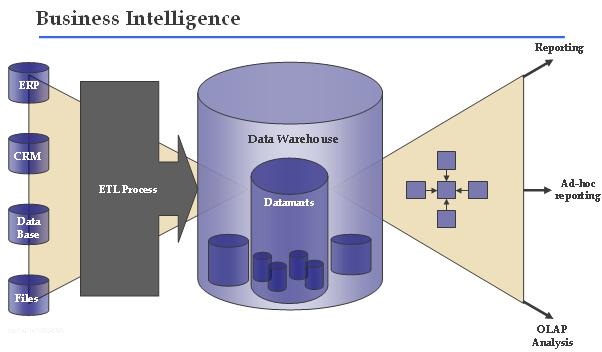Data Warehouse is a central managed and integrated database containing data from the operational sources in an organization (such as SAP, CRM, ERP system). It may gather manual inputs from users determining criteria and parameters for grouping or classifying records.
A source for the data warehouse is a data extract from operational databases. The data is validated, cleansed, transformed and finally aggregated and it becomes ready to be loaded into the data warehouse.
That database contains structured data for query analysis and can be accessed by users. The data warehouse can be created or updated at any time, with minimum disruption to operational systems. It is ensured by a strategy implemented in a ETL process.
Data warehouse is a dedicated database which contains detailed, stable, non-volatile and consistent data which can be analyzed in the time variant.
Sometimes, where only a portion of detailed data is required, it may be worth considering using a data mart. A data mart is generated from the data warehouse and contains data focused on a given subject and data that is frequently accessed or summarized.
A common way of introducing data warehousing is to refer to the characteristics of a data warehouse as set forth by William Inmon:
- Subject Oriented
- Integrated
- Nonvolatile
- Time Variant
Subject Oriented
Data warehouses are designed to help you analyze data. For example, to learn more about your company’s sales data, you can build a warehouse that concentrates on sales. Using this warehouse, you can answer questions like “Who was our best customer for this item last year?” This ability to define a data warehouse by subject matter, sales in this case, makes the data warehouse subject oriented.
Integrated
Integration is closely related to subject orientation. Data warehouses must put data from disparate sources into a consistent format. They must resolve such problems as naming conflicts and inconsistencies among units of measure. When they achieve this, they are said to be integrated.
Nonvolatile
Nonvolatile means that, once entered into the warehouse, data should not change. This is logical because the purpose of a warehouse is to enable you to analyze what has occurred.
Time Variant
In order to discover trends in business, analysts need large amounts of data. This is very much in contrast to online transaction processing (OLTP) systems, where performance requirements demand that historical data be moved to an archive. A data warehouse’s focus on change over time is what is meant by the term time variant.
Reference : http://docs.oracle.com/cd/B10501_01/server.920/a96520/concept.htm

